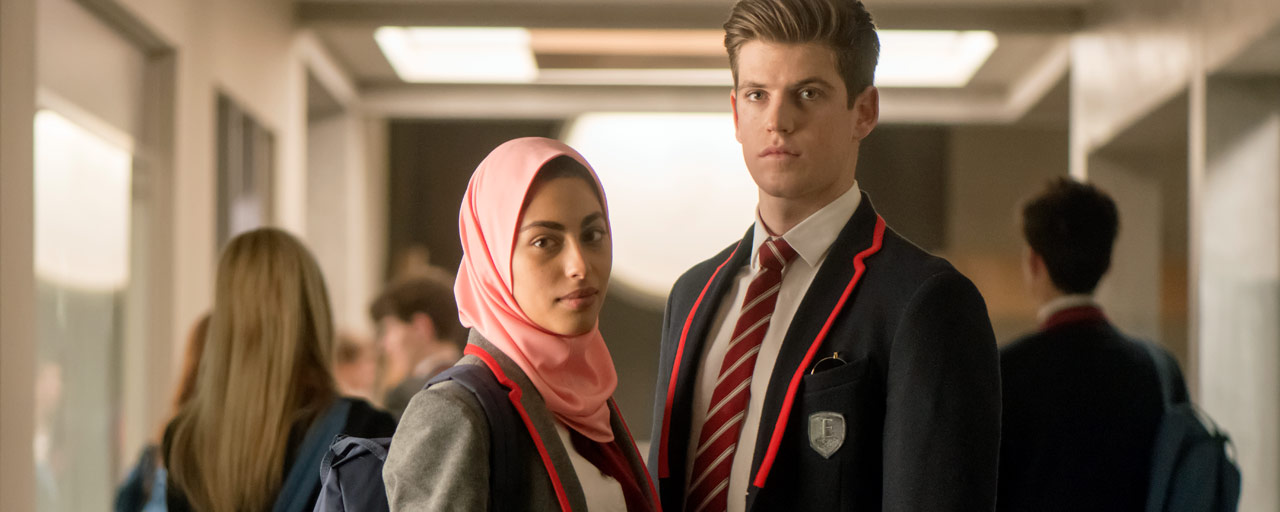Netflix’s new series Élite wins in places many other teen shows fail their audience: it destigmatizes queerness, STDs, polyamory and class differences. The murder mystery melodrama follows three scholarship students as they try to navigate the pristine halls of their fancy new prep school, Las Encinas. But when it comes to the way the Spanish-language series portrays the experiences of the only non-white characters, it falls into harmful stereotypes that perpetuate a rift between the progressive white Europeans and the “backwards” Palestinian Muslims.
When one of the new students, Nadia, arrives at her new school wearing a hijab, her classmates use her religion against her from the very beginning. They start off making bomb jokes, calling her a Taliban member, and even pressuring the school administration to forbid Nadia’s hijab on grounds that it’s a “secular” campus. While it seems at first like the show includes these instances of discrimination to illustrate how difficult they make Nadia’s everyday life, the more we get to see her family, the more Élite weaves a narrative of fear, pressure and pain surrounding the Palestinian character’s faith and home dynamic — especially when it comes to her father’s parenting.
At the beginning of the series, Nadia is not allowed to go to any parties or social events unless her older brother, Omar, or male friend Samuel goes with her. This measure seems harmless enough at first, but slowly derails into her father exerting so much control over her that she’s afraid to tell him she’s been forced to take off her hijab at school or that she’s at a boy’s house working on a class project. The show, then, plays into the notion that her western, more forward-thinking classmates — her love interest Guzman, specifically, with his rosary necklace and cool demeanor — need to help her escape her father’s oppressive household. This portrayal of Nadia’s background ultimately lacks cultural context about the ways that her religion and familial bond could be important and empowering to her, and instead uses it to frame her family’s dynamic as extremely unhealthy.
As we get to know Nadia’s brother, Omar, the picture only grows more and more alarming. Not having received a scholarship to Las Encinas, Omar falls in with the “wrong crowd” and starts dealing weed and pills. He also begins a relationship with Ander, a tennis player at his sister’s new school — but becomes increasingly terrified that his father will find out he’s gay. Although the blossoming queer storyline between these two is where Élite shines the most, Omar’s repressed sexuality and identity makes things increasingly suffocating for him at home, at one point he tells Nadia that he’s “drowning” under his dad’s strict ideological regime, and explaining to Ander that he needs to sell drugs in order to make enough money to leave home (their oldest sister is also revealed to have run away). Without a doubt, Omar’s fear of his father’s rejection and possibly violent reaction is real and valid, but the series strategically pins it against the way Ander’s parents and friends embrace him with open arms, clearly deepening the gap between the rigid, conservative Palestinians and the loving, accepting Spaniards.
As the first season of Élite progresses, Omar and Nadia’s father spirals from being a worried and perhaps overly protective father to a two-dimensional depiction of the archaic, enraged Palestinian Muslim. Although all of the characters are revealed to have somewhat broken, dysfunctional relationships with their parents, it’s Nadia and Omar’s that’s tainted as the most miserable and insufferable. Their father’s lack of compassion and understanding for his children comes to a climax when he argues with the school principal — none other than Ander’s mother — and literally yanks Nadia out of class while the principal inadvertently outs Omar and screams that life for him and Nadia must be “hell” thanks to their father. At a time when Islamophobic hate crimes are seeing a spike in Spain and other European countries, Élite could use its platform to disseminate this notion of the homophobic, sexist, barbaric Muslim, but instead uses it to employ the white savior complex as the rich folks of Las Encinas try to “free” Nadia and Omar from their father and their religion.
By catering to a younger audience, Élite has the opportunity to break down the xenophobic narrative being pushed by right-wing politicians around the world, but instead, through its western lens, reinforces the Islamophobic trope of a household full of patriarchal anger and control. Hopefully, the last emotional scene, in which Nadia stands up to her father and tells him she doesn’t want to only live for her studies and chores, will see a shift in her family’s storyline for the second season — into one that doesn’t require her and her brother’s rebellion to be their only form of redemption, and instead gives the audience a chance to relate to the Nunier family in a positive way — perhaps by bringing on Muslim and Palestinian writers to tell their own story. Oh, and it definitely wouldn’t hurt to see Omar and Ander get their happy ending along the way.

